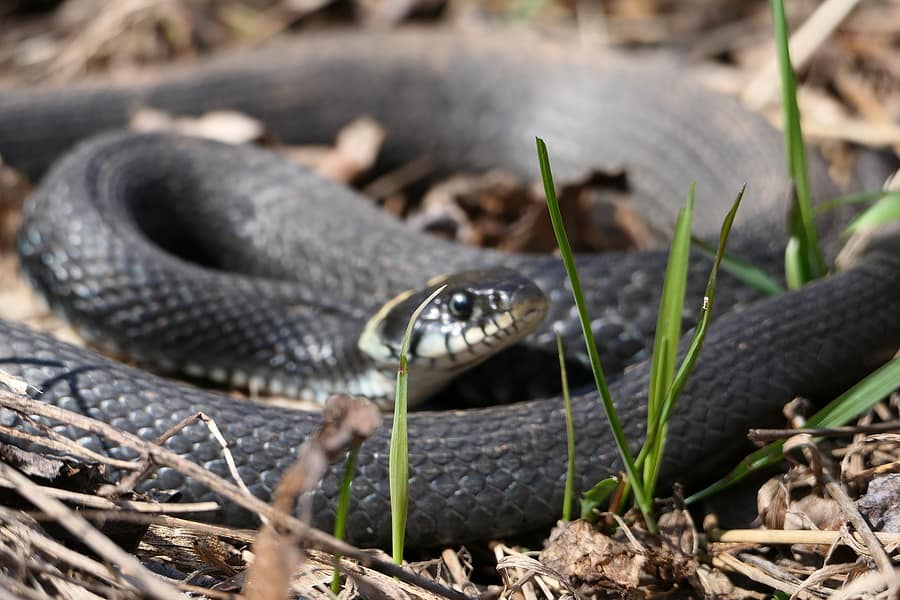
Aug 11, 2022 | Pest Control, Wildlife
As the season shifts from summer to early fall, cooler weather is around the corner. Many pests begin the hustle and bustle of preparing for winter – scavenging and storing food, finding a place to hibernate, or making their way into your home to overwinter. This time of year sees an increase in one pest in particular – snakes! Fall is a time for high snake activity and encounters with humans become more common.
There are many reasons snake control is important in the fall. As the leaves begin to change colors to red, orange, and brown and fall to the ground, they provide the ideal camouflage for snakes. Fall is also the time snakes begin to prepare for brumation and/or hibernation. Most snake species breed in the spring and eggs are hatched by the time autumn rolls around. These juvenile snakes are curious and more likely to be seen by humans. There are 6 venomous snake species in the southeastern United States and each of them actually breed in the fall. This means this time of year males will be actively seeking females to breed with, increasing your chance of an encounter with them. Overdevelopment in many areas has also depleted the natural habitats of many snakes, also increasing their chances of encounters with humans.
Because we see such an increase in snake activity during the fall, snake control becomes much more important. Here are some of our favorite snake prevention tips you can utilize this snake season.
- Familiarize Yourself. Identifying snakes is critical to avoiding and preventing them. Do some research and find out which snakes are common in your area, what they look like, and where to find them. Identify any areas you spend time in outdoors that could potentially house snakes and try to avoid them.
- Be Aware. Be aware of your surrounding when spending time outdoors. Look down when walking and check overhead when in wooded areas. Try to spot snakes before you walk right up on them.
- Avoid Habitats. Snakes like to hide in areas that provide them protection and coverage from predators. They can often be found in tall grass, overgrowth, on or under large rocks, rock piles, and wood piles. If you have to walk through these areas, keep your feet and legs protected, keep your eyes open
- Walk With Confidence. Snakes don’t have ears so they can’t actually hear you coming but they do respond to vibrations in the ground and can feel you coming before they actually see you. When walking outdoors walk with strong, confident steps and make your presence known.
- Cover Up. If you choose to spend time outdoors, make sure to wear closed-toe shoes and long pants if possible. Try to avoid sandals and flip flops as they leave your feet and toes exposed to potential snakebites.
- Look Up. Some types of snakes can actually climb trees and will even use overlapping branches to move from tree to tree without ever touching the ground. When walking or boating through wooded areas make sure to look up and keep an eye out for overhead snakes.
- Clean Up. Making your home and yard less inviting to snakes will help keep them from coming in. Seal any cracks and crevices on the outside of your home to keep snakes out in search of warmth and food. Remove any debris and clutter from your yard and garage. Keep woodpiles elevated and stored away from your home. Clear any overgrowth from your yard.
- Use snake repellent. There are many commercial snake repellent products on the market today. If you prefer a more green snake control option, there are also natural snake repellents you can make at home. Choose whichever option works best for you.
- Call the Pros. Snake control can be a daunting task. If you have a problem with snakes around your home, contact your local pest control company who can help identify what type of snake you are dealing with and help safely and humanely get them away from your property.
You May Also Be Interested In:
Are Mosquitoes Still Active in the Fall?
What Attracts Centipedes To Your Home?
10 Ways To Care For Your Lawn In Extreme Heat
Preparing for Fall Wildlife
Back To School Means Head Lice Season
